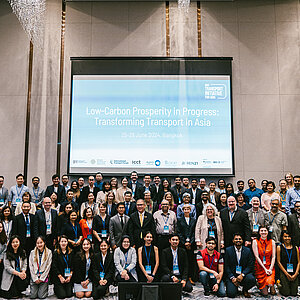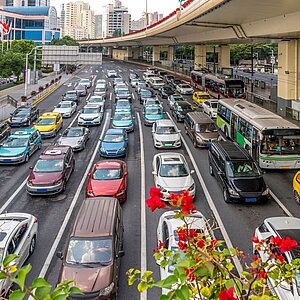Mainstreaming gender: from ideas to action

The IKI-supported NDC Transport Initiative organized a one-day conference in March 2023 to discuss ways of reimagining transport and infrastructure in Indian cities.
The conference focused on achieving gender inclusivity and equitable access to mobility and opportunities. The event was convened under the aegis of the Forum for Decarbonising Transport.
The conference brought together more than 80 gender experts, transport planners, researchers, practitioners, civil society representatives and other stakeholders to discuss the importance of gender-disaggregated data in developing inclusive public transport and public spaces as well as including more women’s voices in critical transport decision-making and planning processes.
Here are five key takeaways from the conference:
Gender-disaggregated data collection
To gain a better understanding of women’s travel patterns and the mobility challenges they face, cities must consider collecting gender-disaggregated commuter data as an integral component of all policy and planning processes. Apart from helping develop gender-responsive interventions, this database can also support public transit agencies in creating robust strategies to encourage women’s participation in the workforce and address gender-blind regulations that impede women from entering and succeeding in the transport workforce.
Women-led transport planning and design
It is essential to incorporate women’s perspectives at every phase of transport and urban planning, from policymaking to implementation. This can be achieved by establishing gender working groups in public transit agencies, fostering inclusive planning through community participation, and developing gender-sensitive indicators to track the growth of municipal transport systems. These continued and deliberate efforts will go a long way towards building more inclusive and equitable transport systems.
Opportunities to enhance gender inclusivity in the transport workforce
The emerging gig economy and electric mobility sector offer new opportunities to integrate women into the traditionally male-dominated transport workforce. Approaches for getting women to enter this workforce include large-scale capacity building and training, creating women-friendly work environments, encouraging more girls to pursue technical courses, and removing gender-blind policy barriers. As the transport industry moves from internal combustion engine vehicles to electric vehicles, it will be crucial to launch targeted formal education and vocational training in order to ensure gender parity and a just transition within the workforce.
Financing the gender-inclusive mobility ecosystem
Gender budgeting is a tool used by governments to ensure that they allocate public funds in a way that promotes gender equality and women’s empowerment. This is particularly effective when gender targets and specific budgets are incorporated into the transportation sector. Women entrepreneurs in the transport sector often face challenges in accessing financing. This can be mitigated by creating financial products and de-risking finance models that cater to their needs. It is also important for mobility enterprises to take a strong gender focus and incorporate women’s preferences in funding schemes to ensure that their initiatives are economically viable.
Collaborations for impact at scale for gender inclusion in transport
Gender-inclusive initiatives have been implemented in some states and cities in India. For instance, two of Mumbai’s metro stations are entirely managed by women, while tenders for electric bus procurement in India mandate that 25% of drivers as well as depot and factory staff be women. While such initiatives are laudable, these efforts must accelerate if they are to have a sustained impact. Taking a programmatic approach to foster collaboration and knowledge-sharing can help institutionalise gender inclusivity among various actors. It is therefore crucial to share ideas and best practices among public transit agencies, ride-hailing companies, para-transit unions and other stakeholders at different levels.
Incorporating women’s voices and representation at every phase of transport and urban planning will help build more inclusive and equitable transport systems in India.
As Mr Amitabh Kant, India’s G20 Sherpa, suggested at the conference, “India’s G20 presidency has put women-led development right in the forefront. We believe that this is the time to focus on women – especially now, when there are more women than men in India. The latest National Family Health Survey finds that there are 1,022 women for every 1,000 men in India. It will not be possible to make India a $5 trillion economy without women playing a pivotal role.”
The link has been copied to the clipboard
Contact
IKI Office
Zukunft – Umwelt – Gesellschaft (ZUG) gGmbH
Stresemannstraße 69-71
10963 Berlin










